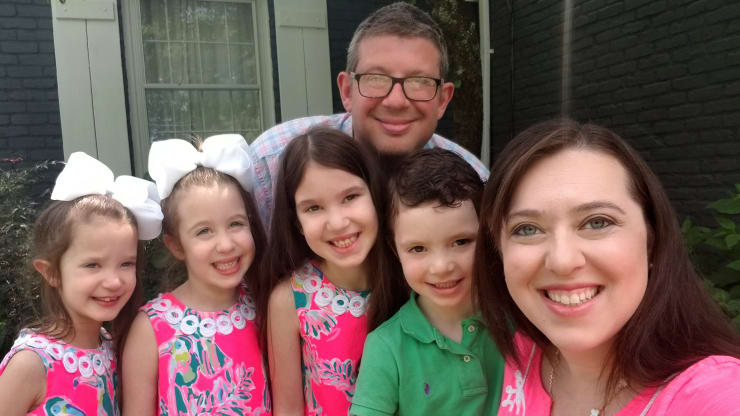School may be out for summer, yet you can still find the time to teach your kids about money — and it doesn’t have to be boring.
“Some parents think they need to have the ‘money talk,’ but it’s actually easier and more fun to do it within the context of when you are doing something,” said Nan Morrison, president and CEO of the Council for Economic Education (CEE).
That can be something as simple as giving kids a set amount of money to buy flowers at the nursery during a shopping trip, explained Morrison, a member of the CNBC Invest in You Financial Wellness Council.
“They get a sense of power and control, and they understand that they can do all those things within the boundaries you set for them.”
To help amp up the fun factor, the CEE has put together materials like games, activities, worksheets and suggested books as part of their Family-At-Home Financial Fun Pack.
In fact, now is a great time to teach your kids about money, since many summer camps are closed and parents are still working remotely, said Thomas Henske, a certified financial planner with New York-based Lenox Advisors.
Once life gets hectic again, parents will wonder if they really took advantage of this time or squandered it, he said.
“The question when the time comes to look back at the quarantine, ‘Will you be proud or disappointed in yourself?’” Henske said.
Diana David Joseph understands the importance of weaving money lessons into her day. She once worked on Wall Street, but now lives in Cincinnati with her husband and four children.
She’s been playing games with coins for her kindergartner triplets and tapping into her third-grader’s inner entrepreneur.

She also spends her time running a Facebook group and website called Parent Vault, which she started as a response to schools shutting down during the pandemic. It’s now replaced its daily lesson plans with weekly, themed camps — including one on entrepreneurship and an upcoming one that will focus on personal finance.
“There is tremendous economic uncertainty that is impacting some families very directly,” Joseph said.
“All of this makes parents particularly keen to teach their kids about personal finance and create teachable moments around topics that are relevant to kids.”
Here are ways you can incorporate financial lessons throughout the day for your kids, no matter their age.
Talk about it
Use meal times to talk to your kids about money.
“It’s important to include children in the conversations,” Morrison said.
At around the age of 3 years to 5 years old, kids may be too young for financial concepts but you can start building a foundation. Part of it is even just hearing the words and learning money vocabulary, said Morrison.
Between 6 and 12, they can start absorbing more concrete information and develop healthy habits.
You can also talk about current events, said Henske, like how to help small businesses struggling right now and whether or not buying a gift card makes good financial sense.
Discussing what’s happening now also helps them understand the importance of trying to save for an emergency event.
Making and saving money

With kids around the house more, let them come up with ways they can earn some extra money.
They can propose a job and then you can have a discussion about how much it is worth, suggested Tim Sheehan, CEO & co-founder of Greenlight, which provides debit cards and savings accounts for kids. Accounts for children on Greenlight have now hit a total of $25 million in savings.
“They start to connect that to: Money doesn’t grow on trees,” he said “You have to earn it. You do work.”
Then, have them purchase things they want with their own money.
“What you are really teaching them to do is live within their means,” Sheehan explained. “That is huge for when they are out on their own.”
If possible, start a savings account for your children. Show them the statements every month.
For instance, the micro-investing app Acorns just launched Acorns Early to help parents save and invest for their children. They can start with just $5 and the kids can access the funds once they reach adulthood. The platform recently began a campaign — #beginatbirth — that gives all babies born in 2020 a free Acorns Early account until age 18.
Make it ‘real’
You can also involve your children in projects, such as starting a business or building a small stock portfolio.
“Have kids start opening up their own investment accounts and think through what stocks you would buy,” Henske advised.
Or, you can simulate stock trading through the SIFMA Foundation’s stock market game. Joseph had her 8-year-old daughter Hannah play stock trading with the London Stock Exchange’s fantasy game.
She also worked with her on several business plans. Hannah started with slime and bracelets, but after some market research determined they weren’t likely to be profitable ventures, she eventually settled on an event-planning business.
“I’ve been completely impressed by her ability to think this through in a much deeper way than we would have if we didn’t have this shelter-in-place coronavirus situation,” Joseph said.
In normal times, “we would have done one business plan and called it a day and gone to soccer practice,” she added.
For her 6-year-olds, she did a penny-stacking race. When the time was up, whoever had the largest stack won — and then they counted how many they had.
Have a movie night
If your kids are in middle school or high school, a movie night can turn into lessons about money, said Henske.
He has watched several films with his kids. “The Big Short,” which tells the story of the 2008 crisis, and “Wall Street” are two examples. “Trading Places,” “Moneyball,” “Dark Waters” and the “Pursuit of Happyness” are others on his list.
At the end of the day, it’s all about finding pockets of time to squeeze in some fun but informative exercises.
“A little financial literacy has some shelf space at a timely point in our history right now,” Henske said.
Free resources
There are numerous free resources available for parents.
In addition to the CEE’s Family-At-Home Financial Fun Pack, you can check out age-appropriate resources on the Consumer Financial Protection Bureau’s Money as You Grow section, as well as the nonprofit Khan Academy, which provides free online courses.
The nonprofit personal finance organization Next Gen Personal Finance also has free online games and activities on topics like investing and budgeting and the National Endowment for Financial Education has free online courses, learning activities and quizzes.
The post Fun money lessons for your kids this summer appeared first on CNBC news and is written by Michelle Fox
Original source: CNBC news






